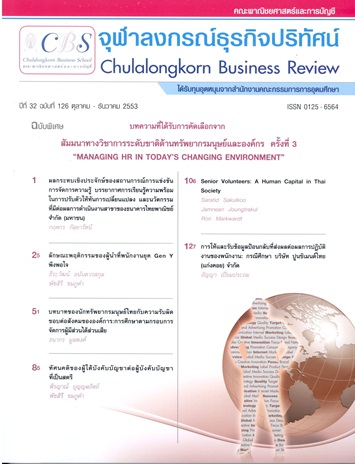บทบาทของนักทรัพยากรมนุษย์ไทยกับความรับผิดชอบต่อสังคมขององค์การ: การศึกษาตามกรอบการจัดการผู้มีส่วนได้ส่วนเสีย
Main Article Content
Abstract
บทคัดย่อ
การศึกษานี้มีวัตถุประสงค์เพื่อศึกษาปัจจัยที่มีอิทธิพลต่อการตระหนักในแนวคิดความรับผิดชอบต่อสังคมของนักทรัพยากรมนุษย์ไทย ซึ่งผู้วิจัยประยุกต์ทฤษฏีการจัดการผู้มีส่วนได้เสียขององค์การเป็นกรอบในการศึกษา รวมถึงศึกษาบทบาทของนักทรัพยากรมนุษย์ในการส่งมอบคุณค่าหรือการตอบสนองต่อความต้องการของกลุ่มผู้มีส่วนได้เสียหลักขององค์การ กลุ่มตัวอย่างประกอบด้วยนักทรัพยากรมนุษย์ที่ปฏิบัติงานในองค์การภาครัฐ ภาคเอกชน และภาครัฐวิสาหกิจ จำนวน 368 คน ผลการวิเคราะห์โมเดลสมการโครงสร้างพบว่า การตระหนักต่อสภาพความเป็นจริงของธุรกิจ ได้แก่ ความรอบรู้เกี่ยวกับเทคโนโลยี เศรษฐกิจและกฎหมาย และโครงสร้างประชากรมีอิทธิพลต่อการตระหนักต่อความรับผิดชอบต่อสังคมของนักทรัพยากรมนุษย์ไทย และยังพบว่า นักทรัพยากรมนุษย์ไทยสามารถส่งมอบคุณค่าให้แก่กลุ่มผู้มีส่วนได้เสียหลักขององค์การ ได้แก่ ลูกค้า ผู้บริหารและองค์การ ตลอดจนพนักงานด้วยเช่นกัน นอกจากนี้ การตระหนักต่อความรับผิดชอบต่อสังคมของนักทรัพยากรมนุษย์ไทยยังเป็นตัวแปรคั่นกลางแบบสมบูรณ์ในความสัมพันธ์ระหว่างการตระหนักต่อสภาพความเป็นจริงของธุรกิจกับการส่งมอบคุณค่าให้แก่กลุ่มผู้มีส่วนได้เสียหลักขององค์การ ในตอนท้าย ผู้วิจัยได้เสนอแนวทางประยุกต์ใช้ผลการศึกษาทั้งในเชิงทฤษฎีและในเชิงปฏิบัติ
คำสำคัญ : บทบาทของนักทรัพยากรมนุษย์ไทย ความรับผิดชอลต่อสังคม การจัดการผู้มีส่วนได้เสีย โมเดลสมการโครงสร้าง การทดสอบอิทธิพลของตัวแปรคั่นกลาง
Abstract
Three hundred and sixty-eight Thai human resources (HR) practitioners were surveyed to investigate the factors influencing their realization of corporate social responsibility (CSR) and to explore how they provided value or responded to the key organizational stakeholders. By using a stakeholder management theory to the study, the results of structural equation modeling indicated that knowing external business realities (i.e., technology, economics and regulatory issues, and workforce demographics) affecting the realization of CSR in Thai HR practitioners. As hypothesized, Thai HR practitioners could deliver value to the key organizational stakeholders (i.e., customers, organization and managers, and employees). Further, the realization of CSR played a full mediating role in the relationship between knowing external business realities and delivering value to the key organizational stakeholders. Implications for both theory and practice were discussed.
Key words : Thai HR roles, corporate social responsibility (CSR), stakeholder management, structural equation modeling (SEM), tests of mediation
Article Details
Opinions and discussions in papers published by the Creative Business and Sustainability Journal (CBSJ) are deemed as personal opinions and the responsibility of the writers. They are not the opinions or responsibility of the Chulalongkorn Business School of Chulalongkorn University.
Papers, content, information etc. appearing in the Journal are deemed to be the copyright property of the Chulalongkorn Business School of Chulalongkorn University. Anybody or any organization that wishes to publish any part of them or use them in any way must obtain written permission from the Chulalongkorn Business School, Chulalongkorn University.


